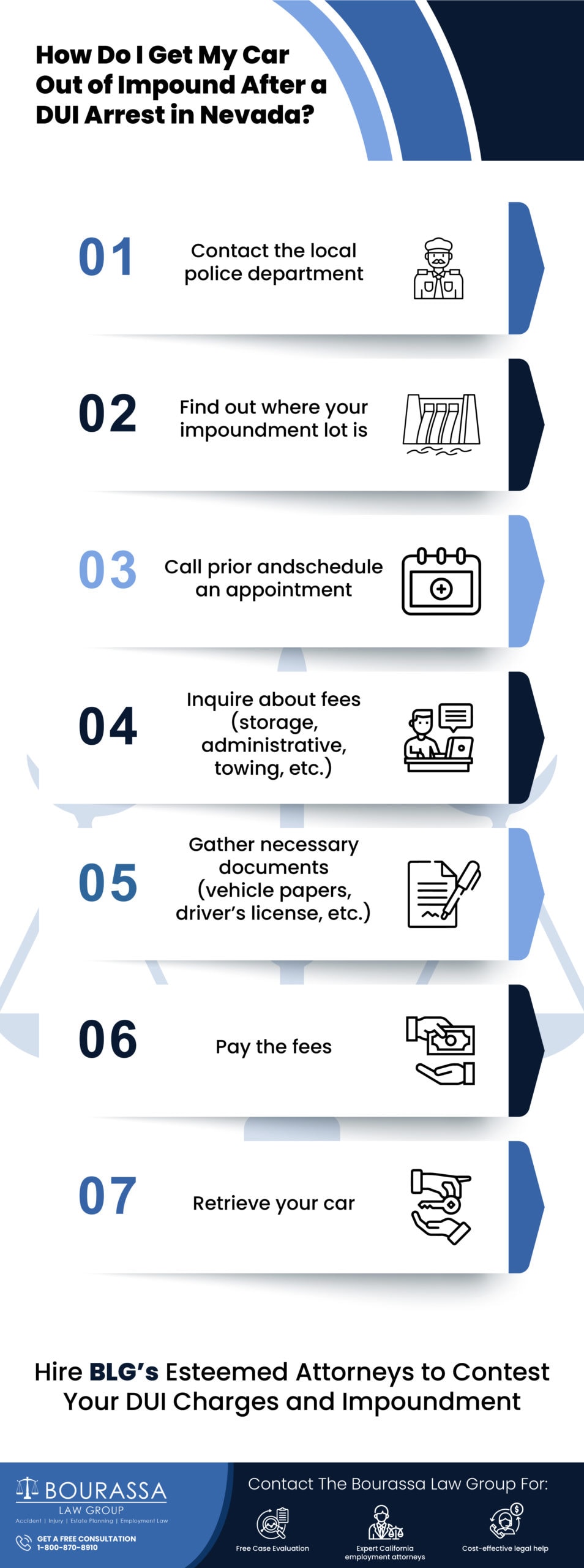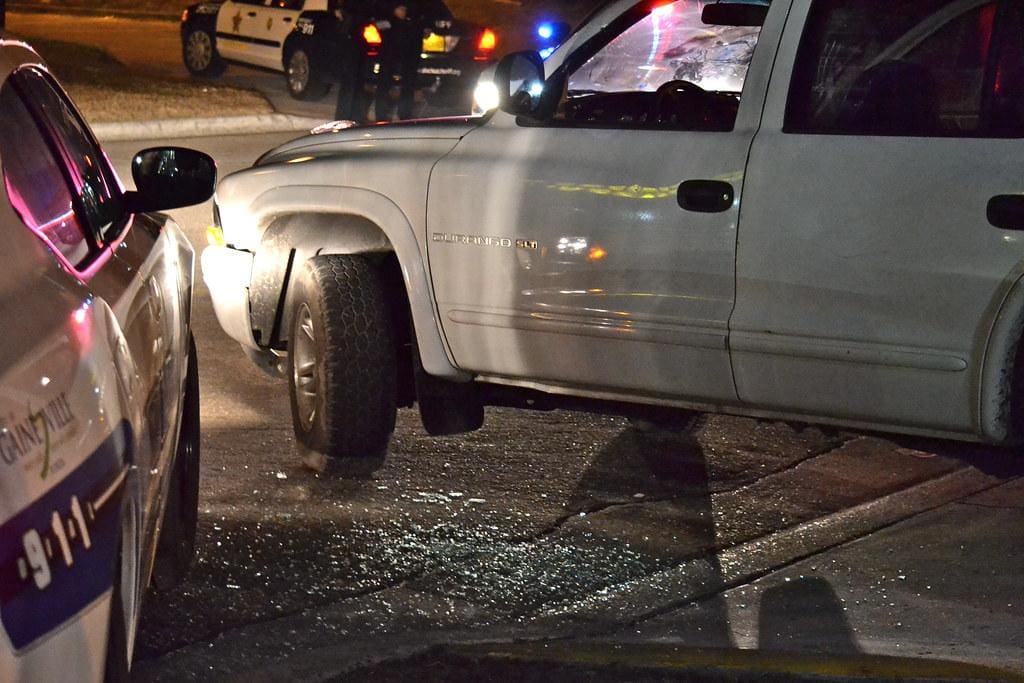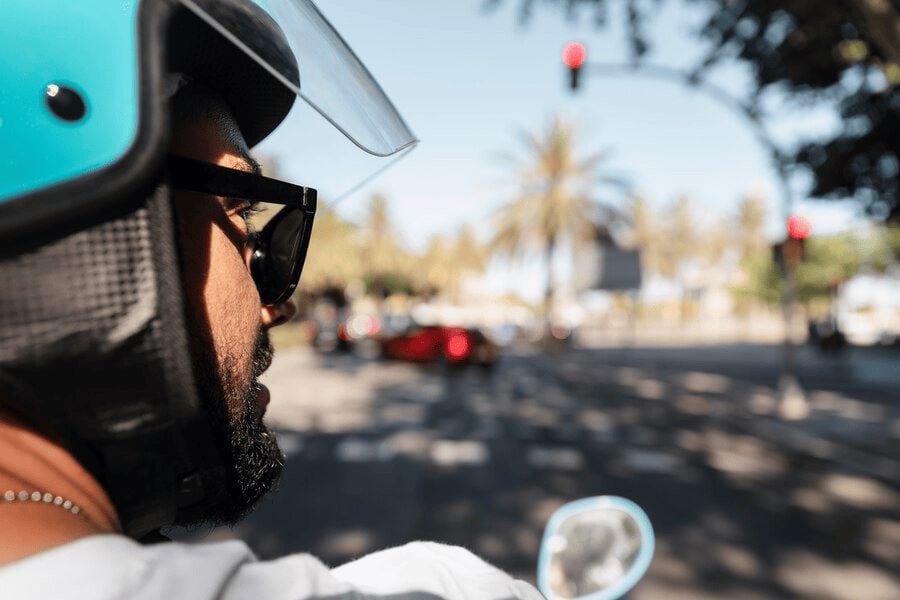
So, you’ve found yourself in a tough spot – your car’s been impounded following a DUI arrest in Nevada. It’s a stressful situation, but don’t worry, you’re not alone. Here’s a comprehensive guide to help you navigate the process and get your wheels back on the road, step by step.
Why Was My Car Impounded After a DUI Arrest?
After being arrested for a DUI in Nevada, several things may occur concerning your vehicle. When police agencies arrest you for driving under the influence, some circumstances might lead to your vehicle being impounded. The primary reasons for impounding a vehicle after a DUI arrest revolve around safety concerns and legal requirements.
Safety Concerns: If the arresting police officer deems that it’s unsafe for you to continue driving, especially if you’re significantly impaired, they may decide to impound your vehicle. They may take this action to prevent any potential accidents or harm that could result from impaired driving.
Evidence in Your Case: Your vehicle could also be considered as potential evidence in your DUI case. Law enforcement may impound it to conduct further investigations, gather evidence such as alcohol or drug presence, and examine the vehicle for any damage or any other related purposes.
Once your vehicle is impounded, it’s taken into police custody or to a designated impound lot. The impoundment is typically carried out by authorized towing companies acting on behalf of law enforcement agencies. This helps make sure that the vehicle is in a secure location while legal procedures are underway.
Remember, the decision to impound a vehicle after a DUI arrest is often at the discretion of the arresting officer and might vary depending on the circumstances of the arrest, the condition of the driver, and local laws or policies.
Understanding why your vehicle might be impounded after a DUI arrest can help you plan the steps required to retrieve it. This includes knowing where it’s held, knowing the necessary documentation and fees, and following the legal procedures to reclaim your vehicle from impoundment.
How Can You Retrieve Your Impounded Car?
Step 1: Find Out Where Your Car Is
The first crucial step is to locate the impoundment lot of your vehicle. Typically, the arresting officer should provide you with this information at the time of your arrest. However, if this information wasn’t provided or you need to confirm it later, you can reach out to the local police department. They can direct you to the impound lot where your vehicle is held. Additionally, some jurisdictions might have online databases or phone services where you can check for impounded vehicles.
Step 2: Gather Required Documents
Before heading to the impound lot, make sure you have all the necessary documents in hand. These include your valid driver’s license, vehicle registration papers, proof of vehicle insurance, and any paperwork related to the DUI arrest. Having these documents readily available will streamline the process of reclaiming your vehicle.
Step 3: Contact the Impound Lot
Once you’ve confirmed the impoundment location, get in touch with the impound lot directly. They will provide you with detailed instructions on the steps you need to follow to retrieve your vehicle. During this conversation, they’ll also inform you about the fees for releasing your car. Be prepared for impound fees, potential storage costs, and any applicable towing fees.
Step 4: Pay the Fees
After gathering information about the fees involved, it’s time to settle the necessary payments to release your car from impoundment. Keep in mind that impound lots often charge daily storage fees, so acting promptly will help minimize these costs. Settling the fees sooner rather than later will also prevent any additional charges from accruing.
Step 5: Provide Proof and Retrieve Your Vehicle
You can then head to the impound lot equipped with all the required documentation and payment receipts. Upon arrival, you need to present these documents to the impound lot personnel. Once they verify everything, you should be able to retrieve your vehicle. Before driving away, make sure you fully understand any specific rules or additional requirements stipulated by the impound lot.
How Much Does the Impound and Storage Fees Cost?
Impound fees are not standardized and can vary based on several factors.
Towing Company Policies: Different tow companies may have their fee structures and policies regarding impoundment. These companies often have varying rates and additional charges, contributing to the overall cost.
Impound Lot Regulations: Each impound company might have its own set of administrative fees for storing impound vehicles. These fees can vary based on the specific lot where the vehicle is held and the duration of impoundment.
Duration of Impoundment: The length of time your vehicle remains in impound directly impacts the total fees. Some impound lots may charge daily storage fees, meaning the longer the vehicle stays, the higher the accumulated costs.
Additional Services or Requirements: Certain additional services, such as administrative processes, documentation, or specialized handling of the impounded vehicle, may result in extra charges.
That’s why you should inquire about the total impound fees required to release your vehicle. You can contact the impound lot or the towing company directly; they will provide you with a breakdown of the fees involved. Also, make sure to act fast to retrieve your vehicle so that you can minimize expenses like the daily storage fees.
The Role of a Criminal Defense Attorney
Facing a DUI charge in Nevada is a complex legal matter with potentially life-altering consequences, encompassing your driving privileges, finances, and freedom. While retrieving your impounded vehicle might be manageable without legal assistance, tackling DUI charges requires professional guidance.
Experienced criminal defense attorneys specializing in DUI cases possess in-depth knowledge of Nevada’s DUI laws, providing crucial insights into your specific situation. They meticulously review arrest details, scrutinize evidence, and identify potential defenses. These attorneys navigate the intimidating legal process, ensuring you comprehend your rights and options. Their representation spans court proceedings, negotiations with prosecutors, and interactions with law enforcement, aimed at securing the best possible outcome. Mitigating charges or penalties is a key focus, with attorneys exploring plea bargains and alternative sentencing options.
Furthermore, their personalized legal support tailors defense strategies to your unique circumstances, offering a strategic plan to address individual needs and objectives. Seeking legal assistance from a criminal defense attorney is strongly recommended, as their expertise, guidance, and advocacy can profoundly impact your case, potentially minimizing charges or penalties and helping you navigate legal complexities with greater confidence. Hence, we highly advise you to seek legal assistance from a criminal defense attorney when facing a DUI charge in Nevada. Their expertise, guidance, and advocacy can significantly impact your case, potentially reducing charges or penalties and helping you navigate the legal complexities with greater confidence.
BLG Is Here to Help Fight Your DUI Charges
Dealing with an impounded vehicle after a DUI arrest in Nevada is undoubtedly challenging. However, by following these steps and understanding the associated fees and requirements, you can expedite the process of getting your car back on the road.
If you need further legal guidance or assistance with a DUI defense, our team at BLG is here to help. Contact us today for a free consultation, and let us assist you in resolving your legal matters swiftly and effectively.
FAQs
Q. Why was my vehicle impounded after a DUI arrest?
A. Your vehicle might have been impounded for safety reasons or as evidence related to your DUI case. Impoundment aims to prevent potential harm from impaired driving and comply with legal procedures.
Q. How do I find out where my impounded vehicle is located?
A. You can ask the arresting officer for information about the impoundment location. If not provided, contact the local police department or check online databases for impounded vehicles.
Q. What documents do I need to retrieve my impounded car?
A. To reclaim your car, you typically need your valid driver’s license, vehicle registration papers, proof of insurance, and any paperwork related to the DUI arrest.
Q. What are the total fees associated with getting my vehicle out of impound?
A. Impound fees vary based on factors like the impound lot, towing company, and duration of impoundment. Contact the impound lot for a breakdown of all fees, including storage costs and potential additional charges.
Q. Can someone else retrieve my impounded car on my behalf?
A. Some impound lots allow designated individuals authorized by law, such as the registered owner, to retrieve impounded vehicles. Check with the impound lot about their specific policies.
Q. Are there daily storage fees, and how can I minimize these costs?
A. Yes, some impound lots charge daily storage fees. To minimize costs, aim to retrieve your vehicle as soon as possible after learning about the impoundment.
Q. What happens if I don’t retrieve my vehicle from the impound?
A. Failure to retrieve your vehicle from impound might result in increased fees, potential legal complications, and the possibility of the vehicle being deemed abandoned.
Q. Can I negotiate or reduce the impound fees?
A. You can inquire about the possibility of negotiating fees directly with the impound lot. However, fees are often non-negotiable, so it’s advisable to clarify fees upfront.
Q. Can I contest the impoundment of my vehicle?
A. You may contest the impoundment if you believe there are grounds for challenge or errors in the process. Seeking legal guidance is advisable in such cases.
Q. What should I do if I believe there are errors in the impound process?
A. Document any discrepancies or errors you believe occurred during the impound process and seek legal advice on the appropriate steps to take.
Q. Does impounding my vehicle affect my insurance coverage?
A. Impoundment might not directly affect your insurance coverage, but specific implications can vary. As the car owner, you should consult your insurance provider for clarification.





